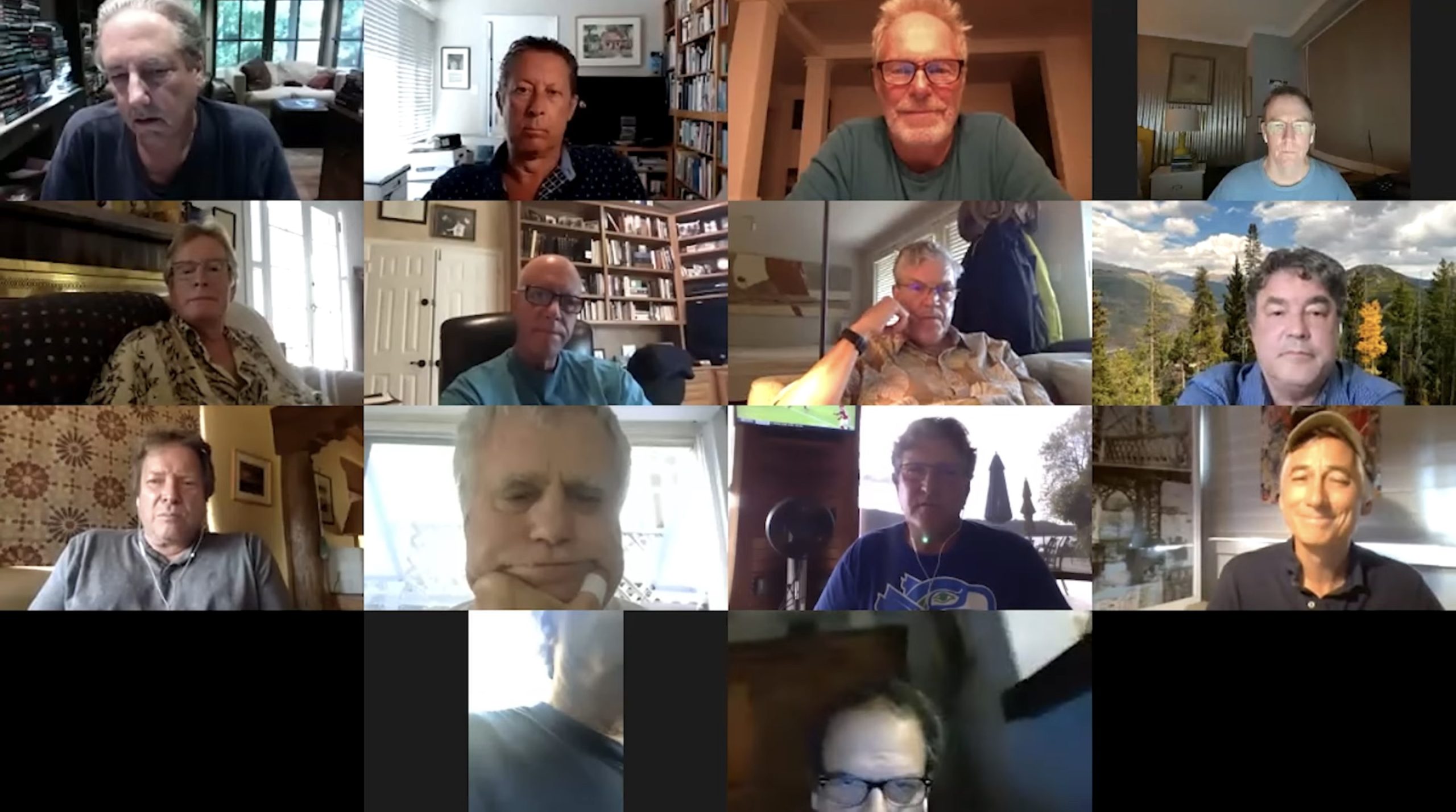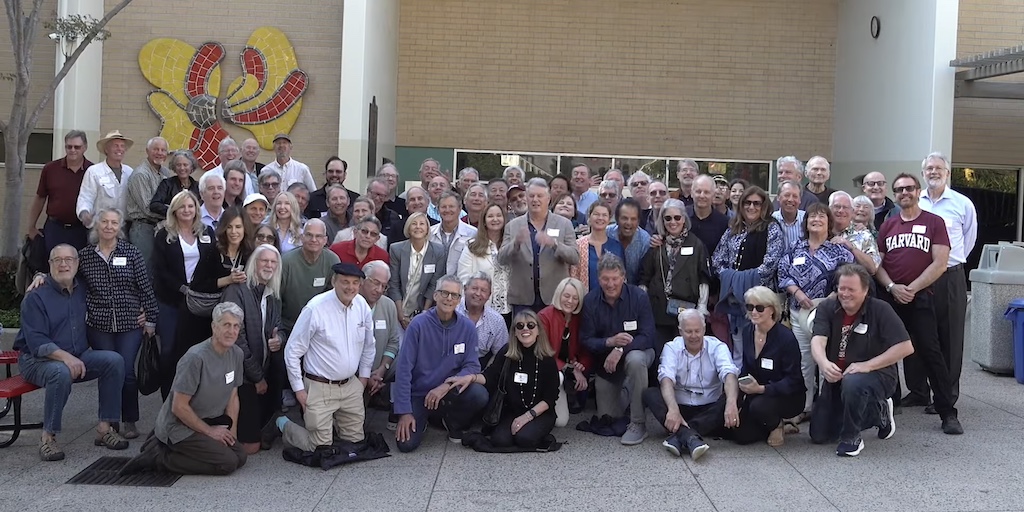Fortunate Sons
When I think back on all the crap I learned in high school
It’s a wonder I can think at all
And though my lack of education hasn’t hurt me none
I can read the writing on the wall
-Paul Simon, “Kodachrome”
Although that song plays us out ahead of and during the credits for the fascinating new PBS documentary Fortunate Sons, our sprawling cast of real-life characters seem to actually have learned a lot from their run at the former Harvard School for Boys in Studio City (now Harvard-Westlake School), and in the 51 years since graduating.
Harvard was unaffiliated with Harvard University, but Boston-born school founder Grenville C. Emery had asked for — and was granted — permission to use the name in tribute.
Fortunate Sons offers an affecting look at how a major period of tumult and evolution in American culture changed and challenged the students and even the core teaching tenets of an exclusive L.A. private school. The documentary also examines the ripple effects that education and those relationships had throughout the ensuing decades as the Class of 1974, as these boys of (mostly) privilege and means navigated an ever-shifting universe and culture, ultimately learning to grapple with what masculinity means in the 21st century.
It’s a fascinating flick, essentially a real-life high school (and middle school) drama, but told with all the insights and self-awareness five decades of post-prep life — the kinds of retrospective knowledge that a Randall “Pink” Floyd or a Samantha Baker lacks in a fictive high school movie told in the moment.
Trailers From Hell caught up with the brains behind the fresh PBS documentary, director/writer/producer Peter Jones, and producers John Bard Manulis and Taylor Vracin-Harrell. Manulis and Jones were both part of the 72-man Class of ’74 depicted in their documentary.
Jones and Manulis helped organize a series of Zoom calls to catch up with their old classmates at the start of the COVID-19 pandemic in 2020. Although their conversations were initially congenial but surface-level (or, in one off-camera instance, standoffish), they soon grew into honest, borderline-therapeutic confessionals. Luckily, the calls were recorded, and the changing dynamics of the talks getting more raw were captured in full.
So at what point did Jones and Manulus realize these calls were becoming something more substantive than mere catch-up chats?
“I don’t think you know fully, until you get kind of deep in certainly, what kind of movie you’re going to have when you’re doing a doc,” Manulus said. “But within a couple of conversations, one thing [that] was clear was that there [were] 30, 40 guys willing to talk about life in a relatively honest way and interested in continuing to do it, because they said, ‘Let’s do this again next month,’ and then, ‘Let’s do this again next month,’ and so that right away was unique.”
“I haven’t seen that. I don’t think any of us had seen that story. In my mind, in independent film, the only thing that truly matters is something that’s unique,” Manulus continued. “And so, we had no idea what that was going to become, but it was worth talking to Peter about and saying, ‘I think there’s something here, do you want to jump in on this?'”
The film essentially operates in two parallel timelines. As we meet our cast of participating alums, they all recall their formative seventh grade enrollment into what at the time was a strict military academy encased within the safety of the suburban sprawl that is the San Fernando Valley. Being 12 in 1968 was no picnic. As tectonic shifts in culture coincided and clashed with an intensifying political climate, Harvard’s very foundations began to feel the impact, too. We track the comrades’ reconnection as the film deftly cuts back and forth between the 2020’s and their school memories.
In the modern timeline, the classmates come together — eventually, beyond the Zoom calls — to plot an epic 50th anniversary celebration for 2024.
Aware that the times, they were a-changing, Harvard dropped the military academy element a year after the Class of ’74 arrived as seventh graders. By the time they graduated, some were making bongs with their teachers.
Beyond the Zoom calls and the behind-the-scenes progression of 50th anniversary prep, Jones corralled 30 of their classmates for extended follow-up interviews to flesh out their stories. Thanks to the relative casualness of the (mostly) Zoom set-ups for these talks, things got excitingly candid.
In some instances, old wounds were healed.
“When I did individual interviews with 30 guys [after the initial Zoom conversations], they opened up remarkably, and I really attribute it to the pandemic and this thing called Zoom where you didn’t have a camera crew and lights and all that, and they’re talking to me, a classmate, and they just opened up over the course of sometimes up to 10 interviews each. There’s one guy, Martin Montague [the son of Los Angeles radio personality Nathaniel ‘Magnificent’ Montague, now a pilot and engineer], that started off by telling me to go f— myself, and [said], ‘I hated that school and that class.’ Now we talk every day.”

The access, comfort and depth fostered by years’ worth of interviews helps the film appraise these men’s experiences across the last 57 years — essentially tracking their progress from seventh grade through to today — with a special vulnerability.
“There’s a trust there — not just between them and Peter as classmates, but with each other, and being open with each other and comfortable with each other from this relationship that was built at a point when no one had even egos and agendas and careers and stuff, so there was a trust that came from that,” Manulis said. “Even though they hadn’t been in touch with each other over the years, they kicked back into [those connections] really easily.”
Not just anybody was allowed onto Harvard’s hallowed grounds in that era. We meet one alum whose grandfather in Franklin Delano Roosevelt’s cabinet and his father was a film producer. Another was the grandson of Louis B. Mayer. But of course, as the sons of powerful figures, many of these kids were a bit removed from their busy families — a recurrent note is that several were closer to their nannies than their parents.
The film tracks the journeys into adulthood of these big personalities who were groomed to lead, taking stock of where they wound up, and frames it all within the ever-evolving state of the world today and their place in it. In a poignant postscript touch, we discover that some members of the Class of ’74 have sadly passed on since just the end of production.
Via the doc, we glean significant insights into the “micro-climates of class” that existed even within the West Side of Los Angeles — we are told there was a perceived difference between the inhabitants of lower Bel Air and upper Bel Air.
The program at the beginning was “wildly strict.” Teachers would threaten tardy students with a cattle prodder. Seventh graders would be hazed eighth graders. Everyone, regardless of their personal religious affinity, had to attend church every morning.
By the time the Class of ’74 hit eighth grade, out were the military uniforms. Over the ensuing few years, students found themselves in the throes of the cultural zeitgeist, which included escalating political chaos and the arrival of arena rock began reflecting in the suddenly far less stringent approaches of Harvard staffers. Yoga classes became part of the menu, as were the works of Sigmund Freud, Carl Jung, Fyodor Dostoyevsky, and Upton Sinclair.
Real life for many of the subjects beyond the nurturing-if-evolving environs of high school was occasionally harsh, often disrupted by familial dysfunction, addiction issues, and, later, some health challenges. Many alums had major success. But a recurrent thread with the present-day talks was something of a reckoning, a frank look at the changing nature of masculinity in the 21st century U.S.
This kind of candor happened, in part, thanks to the unique window in time fostered by the start of the pandemic, as Vracin-Harrell observed.
“It was COVID time, and everybody was made physically vulnerable to this disease and was also very emotionally vulnerable and was really seeking I think some connection, some understanding, some order to the madness that was going on,” Vracin-Harrell said. “So the idea of being able to have one constant or one known element, which is, ‘Okay, this guy that I knew back in the day [is organizing these monthly meetings],’ it brought some little bit of peace and I think did kind of help the people to open up. Peter always talks about, as we got out of the [pre-vaccine era of] the pandemic, guys retreated a little bit. They got a little less accessible, just as jobs came back, and people weren’t just home all the time. They really weren’t quite as accessible.”
When it came time to packaging the project for distribution, the choice to partner with PBS emerged as a fairly natural fit when it came to both maximizing engagement and honing in on a projected target audience for the story.
“I had always wanted PBS, because there’s 73 million Baby Boomers [the subject and target of the documentary, after all] and they know PBS,” Jones revealed.
Fortunate Sons is readily searchable on both the PBS website and on the PBS streaming app. It will soon be made available for Video On Demand (VOD).
“It’s the issue of, in a pretty flooded market, how to actually stand out” Vracin-Harrell said. “If you’re one of a slate and you’re just sort of a bit of content, not really getting the individual attention or the promotion from a larger streamer or some of the other outlets, you can kind of just disappear and then not be able to distribute your film further. I think just looking at the target audience of this film, which we do hope is everyone but the really core group is Baby Boomers — who especially resonate and respond to the messages — PBS is a great option, because people who are actually still watching TV tend to be older.”
Manulis broke down why PBS in particular made the most sense as the best possible home for Fortunate Sons.
“And marketing in general, there is no film for everybody,” Manulis said. “There’s some three-sector films, there’s just no film for everybody. And with no marketing dollars, all you can do is go after your core audience and then hope that it resonates with them, get word of mouth, and have other people hear about it and start to pay attention. So while we’re seeing that a pretty wide demographic is responding to this emotionally in a really deep way and talking about it and being passionate about it… the focus that PBS gave us and the ability to start to sort of generate that word of mouth and that awareness is a perfect fit, actually, moreso about eyeballs than about revenue.”
Free, Virtual, On-Demand screening for International Men’s Day and Men’s Health Month
Dates: Beginning 11/15/25 and continuing through 11/22/25
Register at: https://www.filmplatform.net/events/fortunatesons-2/
Use Invitation Code (case-sensitive): FSI-IMD

